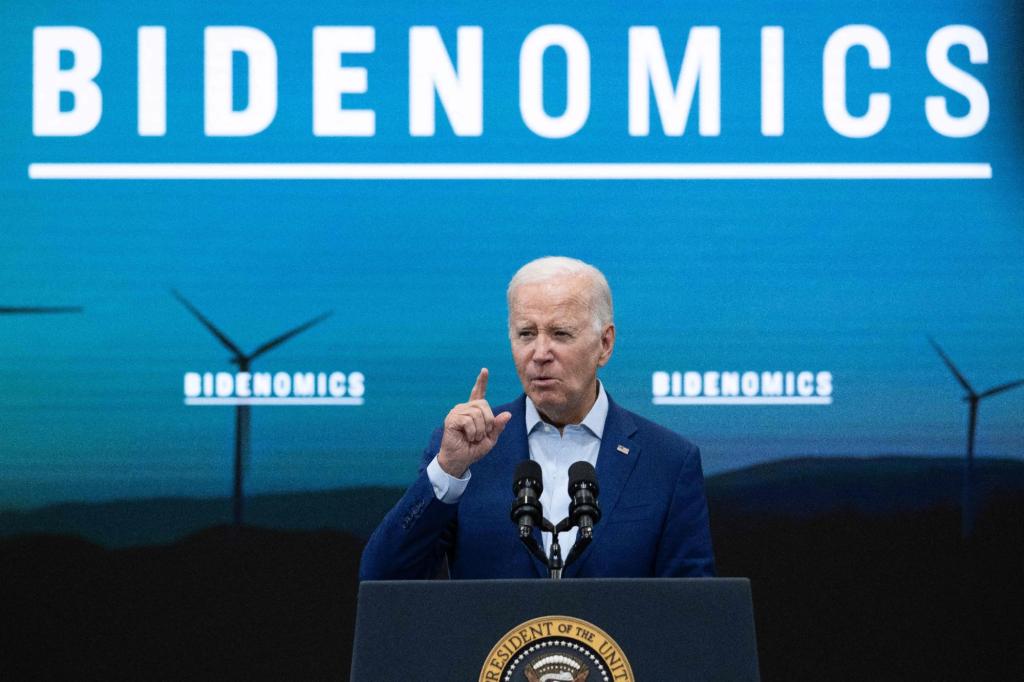During Bill Clinton’s 1992 presidential campaign, strategist James Carville famously wrote on a whiteboard in the war room “The economy, stupid” — in large letters to keep it at the front of the campaign team’s minds.
The economy was just coming out of a recession that had left unemployment stubbornly high.
When Americans went to the polls in November that year, the rate was 7.4%.
While the phrase has stuck in the public mind, the idea that elections might swing on the health of the economy was nothing new.
Carville was keen to focus on the economy not because he had concocted some ingenious new strategy but because he knew how large a factor the economy is in elections and the incumbent George H. W. Bush was widely seen as having mismanaged it.
The best study on the relationship between the economy and elections comes from Britain: Throughout the 20th century, that nation has had a lot more economic turmoil than the United States, making the relationship easier to study.
The paper, by University of Oxford Professor Stephen Fisher, finds that the impact of economic crises on elections is profound — especially for the party in power.
Since 1922, Fisher finds 13 elections not preceded by economic crises. In 10 of these elections the incumbent party wins. In the other 14 elections, which were preceded by an economic crisis, the party in power lost nine.
Not accounting for any other factors, the study implies that if there is an economic crisis the party in power has roughly a 64% chance of losing the election.
While no similar study has been done in the United States, a brief look at the history is instructive.
Between 1948 and today, the economy was in recession in an election year five times: 1948, 1960, 1980, 2008 and 2020. The only time the party in power managed to retain the presidency in those five years was when it ran Harry Truman in 1948.
In the four other years, we saw the challenger win the election: John F. Kennedy in 1960, Ronald Reagan in 1980, Barack Obama in 2008 and Joe Biden in 2020.
This suggests the “recession effect” is even more pronounced in America than it is in Britain.
What does this mean for the 2024 election? Economists have been expecting a recession for some time.

Many in financial markets have come to say the upcoming recession is the most anticipated in history.
This is not surprising. High inflation has pushed the Federal Reserve to raise interest rates.
Over the past few decades, interest-rate hikes of the magnitude being undertaken are an almost surefire way of generating a recession.
Many of the typical recession indicators are flashing red too. Economists and financial analysts often look at the yield curve to determine if markets think a recession is about to take place.
The yield curve is like a menu of interest rates on debts of varying lengths.
If it is more expensive to borrow over the shorter term than over the longer term, analysts say that the yield curve has inverted, and a recession is inbound.
Today the yield curve is more inverted than it has been at any time since 1981, and it has been inverted since July of last year.
No wonder everyone has been anticipating a recession for so long.
So will a recession occur before the election at the beginning of November next year?
The best way to look at this is to examine the housing market, which has been overvalued for some time and is taking a serious beating from rising mortgage rates.
Data show that house prices across the country have been falling on an annual basis since April of this year, at an average rate of -0.3%.
Falling house prices usually signal that homebuilders are going to pull back on new builds. This leads to layoffs in the construction sector and should be enough to trigger a recession.
Last time we saw house price declines like we are seeing today — in early 2007 — construction layoffs were already taking place. Yet this time around more and more construction workers are being hired.

Data on the issuance of permits for new builds show something similar.
We have seen annual growth in permits contract for 11 straight months, at an average rate of -17.7%. Last time we saw similar data over an 11-month period was between April 2006 and February 2007, and it preceded layoffs in the construction sector.
What the data are telling us is that construction employment should have collapsed already.
Unless we see a major turnaround in the housing market, we should therefore see construction employment fall in the coming months.
Is there enough time between now and the election for this to cause a recession and damage President Biden’s chances of re-election?
Last time around it took 11 months of falling construction employment to cause a recession.
If I were a political strategist, I would be following the construction-employment numbers very closely between now and February.
If construction employment starts to contract in the next six months, there is a very good chance Biden will be facing re-election in the midst of a recession.
Philip Pilkington is a macroeconomist and investment professional.
𝗖𝗿𝗲𝗱𝗶𝘁𝘀, 𝗖𝗼𝗽𝘆𝗿𝗶𝗴𝗵𝘁 & 𝗖𝗼𝘂𝗿𝘁𝗲𝘀𝘆: nypost.com
𝗙𝗼𝗿 𝗮𝗻𝘆 𝗰𝗼𝗺𝗽𝗹𝗮𝗶𝗻𝘁𝘀 𝗿𝗲𝗴𝗮𝗿𝗱𝗶𝗻𝗴 𝗗𝗠𝗖𝗔,
𝗣𝗹𝗲𝗮𝘀𝗲 𝘀𝗲𝗻𝗱 𝘂𝘀 𝗮𝗻 𝗲𝗺𝗮𝗶𝗹 𝗮𝘁 [email protected]


